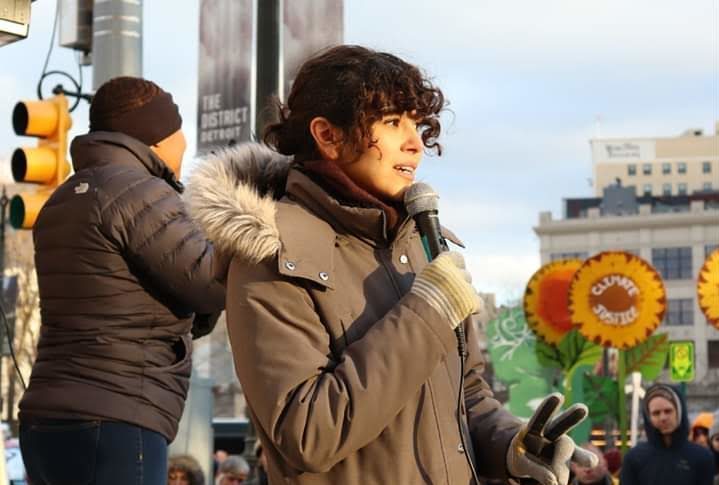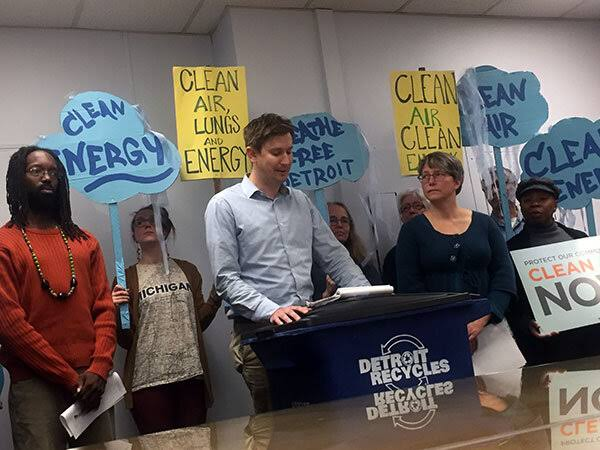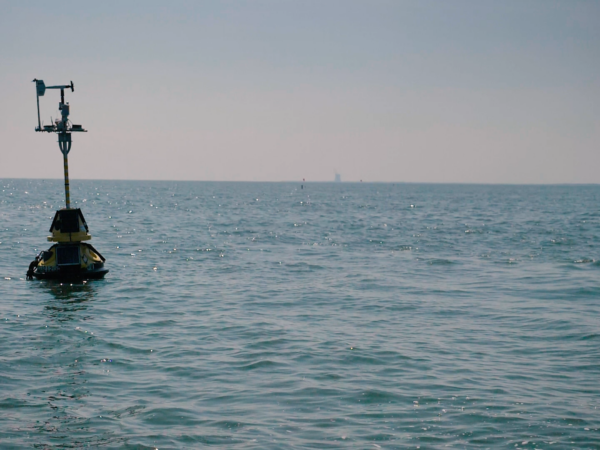
Elections have consequences, the saying goes, and for the Michigan Democratic party, the election last week resulted in a sweep of the race for governor and the legislature.
Now comes their opportunity to deliver on long-stalled environmental initiatives.
Gov. Gretchen Whitmer was re-elected and for the first time in almost 40 years, Democrats will be the majority in the legislature. The results prompted Whitmer to say it’s time to “step on the accelerator” to enact her administration’s priorities that include her climate plan, clean water and environmental justice initiatives.
“Stepping on the accelerator is exactly what we expect not only from the Whitmer administration but also from our legislators,” Detroit environmental attorney Nick Leonard told Great Lakes Now.
Leonard directs the Great Lakes Environmental Law Center and has been a critic of the Whitmer administration for its lack of action on environmental justice issues, highlighted by its handling of the Benton Harbor drinking water crisis in 2021.
Great Lakes Now asked Leonard and other environmental advocacy executives for their priorities for the governor and legislature.
The inquiries were conducted by email and responses were edited for clarity and length.
Nick Leonard said it’s time “to build on all of the preparatory work done in Governor Whitmer’s first term and translate it into creating new laws and policies that will lead to changed outcomes in communities of color throughout Michigan to address the significant issues they are facing.”
Leonard has been critical of the Whitmer administration for being too focused on “procedural and administrative” activities instead of outcomes.
He acknowledged the advantages that Democratic elected officials now have but said, “we also need stronger leadership from Governor Whitmer and from the Michigan Department of Environment, Great Lakes, and Energy on environmental justice issues.”
On climate, Leonard said it’s time to “move aggressively to implement the lofty goals” in Whitmer’s plan, but he wants it done in a manner that will center on environmental justice. He expressed concern that Michigan’s move toward electrifying the economy will present an environmental justice threat.
“There is a significant chance that this plan will lead to a future in which people of color and lower income are not only disproportionately burdened by gas-fired power plants that will power our increasingly electrified communities, but also that such people will not be able to acquire an electric vehicle or other goods in order to realize the benefits of electrification,” Leonard said.

Great Lakes Environmental Law Center executive director Nick Leonard speaks at at event. (Photo Credit: Great Lakes Environmental Law Center)
On drinking water, Leonard called for adoption of “a set of standard protocols for how state and local governments are to respond to drinking water emergencies that could potentially threaten public health.”
In 2021, Leonard was part of a broad citizen coalition that petitioned the U.S. EPA to use its emergency authority to intervene in the Benton Harbor drinking water crisis. The request for EPA intervention was similar to what occurred during the Flint water crisis under former Gov. Rick Snyder.
Monica Lewis-Patrick
Given the election outcome in Michigan, Monica Lewis-Patrick said “we see an opportunity for Governor Whitmer to continue prioritizing the needs of Michiganders as it relates to securing the human right to water by codifying statewide water affordability legislation that supports urban, suburban, and rural areas of our state.”
Lewis-Patrick is the president and CEO of the non-profit We the People of Detroit.
“We know that we can turn this moment into a win for water affordability for all Michiganders and position the great state of Michigan to serve as a beacon for the Great Lakes and the nation,” she said.
Lewis-Patrick said the Whitmer administration has a distinct opportunity to increase the skills of the workforce in Michigan using the Biden administration’s Justice40 framework, which can direct funding to disadvantaged communities that have been marginalized and overburdened by pollution.
Michelle Martinez
Detroit’s Michelle Martinez said a top priority is for the state legislature to “seek out mechanisms to fund the renovation of our public water systems, and make sure everyone in Michigan has safe, affordable drinking water.”
Martinez is a long time environmental justice advocate and is the Inaugural Director of the Tishman Center for Social Justice and the Environment.
On climate, Martinez said “the best way to reduce oil and gas consumption is by shifting to a robust public transit and mobility agenda,” which would allow for safe and easy transit.
Specific to the legislature, Martinez wants a focus on reducing greenhouse gas emissions equitably by “expanding access to solar for homeowners and finally saying no to monopoly utility lobbyists who continue to try to smash competition, and deny residents access and fair compensation for energy generated by rooftop solar.”
And Martinez called on lawmakers to “deal with the problem of environmental racism head on and finally put it to bed.”
She wants the legislature to implement policies that measure the total impact from waste, air pollution and water contamination on low income, Black and Latinx communities who she says “bear the brunt of pollution in Michigan.”
Activists have been advocating for those cumulative impact policies “for over a decade,” Martinez said.
Liz Kirkwood
Traverse City’s Liz Kirkwood said the election results “mark a watershed opportunity for the Whitmer administration to boldly lead and establish a legacy for long-term Great Lakes protection and stewardship.”
Kirkwood is an attorney and executive director of For Love of Water, a non-profit focused on applying Public Trust principles to conservation issues.
That stewardship should also prioritize rebuilding water infrastructure projects like lead service line replacements in disproportionately impacted communities, Kirkwood said. FLOW was part of the coalition that petitioned the EPA in the Benton Harbor crisis.
Michigan’s groundwater is at times referred to as the 6th Great Lakes given its volume and Kirkwood wants to see “groundwater reform prioritized with regulations to hold polluters accountable.”
Michigan is an outlier state when it comes to regulating septic systems as it lacks a sanitary code and Kirkwood said, “with a favorable legislature, the Whitmer administration finally has a chance to pass a common-sense state-wide septic code that addresses all 1.25 million septic systems and creates a funding stream for routine inspection, maintenance, and replacement of those systems.”
As governor, Whitmer can play a leading role in addressing the bottled water exemption in the Great Lakes Compact, Kirkwood said. The Compact is the eight-state agreement designed to prevent diversions of water outside the Great Lakes basin.
She called on the governor to support model legislation that would generally prevent diversions of water in containers less than 5.7 gallons, commonly known as the bottled water loophole in the Compact.
If enacted, the model legislation would require small container diversions to be aligned with Public Trust principles, licensed by the state and subject to royalties that benefit public water.
As a candidate in 2018, Whitmer cited bottled water in her water policy agenda as an issue that required attention.
“Water withdrawal for bottling water has been steadily increasing at cheap rates, meanwhile Michiganders themselves struggle to pay past-due bills for undrinkable water,” the document said.
In 2020, the Department of Environment Great Lakes and Energy dismissed a case that challenged the permit issued to Nestlé Waters North America in 2018 for increased water withdrawals from its bottled water facility in Osceola County.
In a press release after the dismissal, EGLE Director Liesl Clark said she welcomed action by the legislature to update regulations to provide the agency with more authority over water withdrawals for bottled water.
Clark did not indicate if she would lobby the legislature to take action.
Catch more news at Great Lakes Now:
Michigan Gov. Whitmer’s plan needs to move from aspiration to action, says Detroit climate advocate
Substantive change will require a ‘massive culture shift’ in federal, state and local agencies
Featured image: Michelle Martinez (Credit: Valerie Jean via Michelle Martinez)




